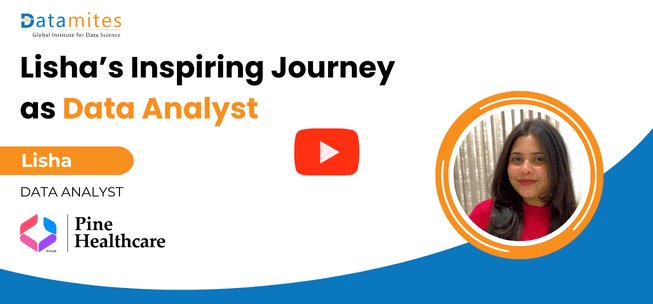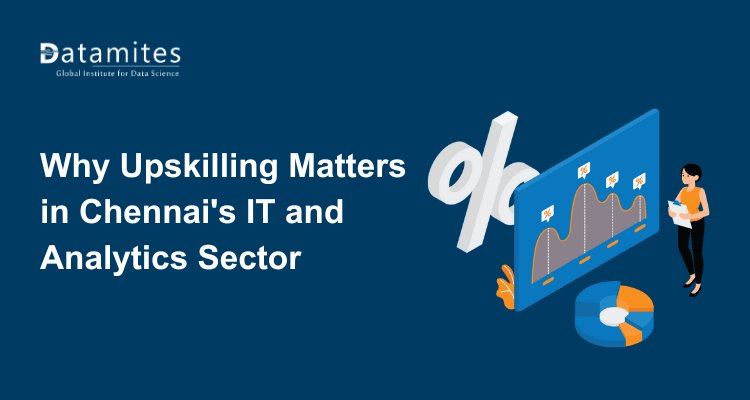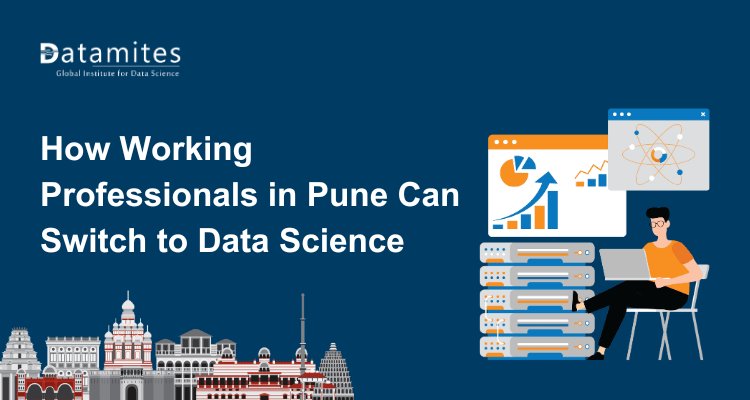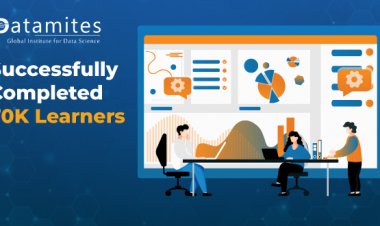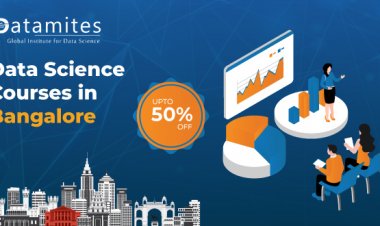Lisha’s Inspiring Journey as Data Analyst
Lisha’s journey from a science graduate to a thriving data analyst proves that with dedication, practical skills, and persistence, career transitions are achievable. Her story inspires aspiring professionals to pursue their goals with confidence and preparation.

In a world where data-driven decision-making shapes every industry, transitioning into data analytics is both exciting and rewarding. Lisha Kiran Ramani’s journey from a physics postgraduate to securing a role as a Data Analyst at Pine Healthcare is a shining example of how dedication, the right training, and perseverance can transform a non-technical background into a successful data career. She delves into her experience, learning process, interview insights, and the key takeaways for aspiring professionals looking to make a similar switch.
From Graduate to Successful Data Analyst
Discover how Lisha Kiran Ramani transformed her academic background in Physics into a career in data analytics, proving that by choosing the best IT Courses with the right skills and determination, anyone can break into the tech industry.
Q1: Can you start by introducing yourself and your background?
Lisha: I’m Lisha Kiran Ramani from Nagpur, Maharashtra. I hold a bachelor's and master's degree in Physics. After completing my education, I transitioned into data analytics by taking a Data Science course from DataMites. I’m now working as a Data Analyst at Pine Healthcare.
Q2: What inspired you to move from Physics to Data Analytics?
Lisha: Data Science is a rapidly evolving and trending field. I saw its growing application everywhere and realized the potential. That interest led me to explore and eventually pursue a career in this field.
Q3: How was your interview process for your current role?
Lisha: The interview process was fairly simple just one round. They asked basic questions on Python, SQL, and Excel. No machine learning or deep technical questions were asked.
Q4: Were the questions theoretical or practical?
Lisha: All questions were theoretical, no hands-on tasks or live coding.
Q5: How many interviews did you attend before getting placed?
Lisha: I appeared for about 4 to 5 interviews before successfully getting placed.
Q6: What topics were usually asked in your previous interviews?
Lisha: Most interviews asked basic questions in Python, SQL, and statistics. Some companies had 4–5 rounds, while others had only 2–3. All emphasized clarity in fundamentals and some involved practical problem-solving.
Q7: Coming from a non-tech background, did you find Python challenging?
Lisha: Python wasn’t difficult, but it required consistent practice. I dedicated 4–5 hours daily, especially being from a non-technical background.
Refer to the articles:
- Harshavardhini’s Journey from Fresher to Data Analyst
- Suhail’s Career Path from Student to Data Analyst
- Shivangi’s Inspiring Journey as a Data Analyst
Q8: What helped you most in cracking the interviews?
Lisha: Having strong foundational knowledge in Python, SQL, and statistics was key. Also, working on real-world projects helped me understand how to apply my learning effectively.
Q9: Tell us about the projects you worked on.
Lisha: I worked on five projects including Employee Performance Analysis, Rainfall Prediction, Blood Donation Analysis, and Portuguese Bank Marketing. These helped me understand practical data applications and boosted my confidence.
Q10: Were projects helpful in your learning journey?
Lisha: Absolutely! Projects helped me see where I was lacking and improved my problem-solving skills. The hands-on experience complemented the theoretical learning and made my knowledge more applicable.
Q11: What tools are you currently using in your job?
Lisha: Currently, I primarily use Excel in my role. Though I learned multiple tools like Power BI, Python, and SQL, it depends on the company’s requirement. In many cases, even today, Excel remains the most used tool.
Q12: What are the essential tools one should know for a data analyst role?
Lisha: At the very least, one should know Excel, SQL, Power BI, Python basics, and statistics. These form the backbone of most data analyst roles.
Q13: How did you frame your resume to stand out?
Lisha: A good resume is very important. I included all the skills I had, detailed my projects, and also linked my GitHub and Kaggle profiles. Projects showcased my practical capabilities and helped me get interview calls.
Q14: What was the most challenging part of your journey?
Lisha: The toughest part was facing multiple rejections after putting in months of learning. It can be demotivating, but I learned from every interview and improved each time.
Q15: What advice would you give to aspiring data analysts?
Lisha: Don’t rely only on theory practice is crucial. Work on at least 3–4 real projects to understand your strengths and gaps. Don’t get discouraged by rejections; each interview teaches you something new. And most importantly, keep your basics strong.
Key Takeaways from Lisha's Journey:
Lisha’s journey from a non-technical beginner to a confident data analyst offers valuable lessons for aspiring professionals, proving that persistence, skill-building, and the right mindset can turn career aspirations into reality.
1. Background Doesn’t Define Your Future: Lisha’s success proves that a non-technical background is not a barrier. Curiosity, dedication, and consistent learning can help anyone build a successful data analyst career.
2. Master Core Technical Skills: A strong grasp in the skills required for data analyst of Python, SQL, Excel, and statistics is crucial for clearing interviews and excelling in data analytics roles.
3. Work on Real-World Projects: Hands-on projects for data analyst bridge the gap between theory and application, showcasing your practical problem-solving abilities to potential employers.
4. Value Traditional Tools Like Excel: Even in the age of advanced tools for data analyst, Excel remains one of the most powerful and widely used applications in the data analytics industry.
5. Build a Strong and Targeted Resume: Highlight your skills, projects, and portfolio (GitHub, Kaggle) to make your profile stand out and attract recruiter attention.
6. Stay Persistent and Keep Learning: Setbacks are part of the journey view every interview as a learning experience, practice daily, and build confidence through consistency.
Lisha’s transformation from a science student to a successful data analyst illustrates that career shifts are possible with the right mindset and strategy. Her journey, featured among inspiring
DataMites success stories, underscores the value of practical projects, foundational skills, and resilience in achieving goals in the data analytics domain. If you’re considering a career in data analytics, let Lisha’s success story motivate you to take that first step because with the right preparation, your breakthrough could be just one interview away.
Refer to the articles:
- How to Become a Data Analyst in India
- How much is the Data Analytics course fee in India
- Data Analyst Career Scope in India
Pursuing a Data Analyst course in Pune or major tech hubs such as Pune, Chennai, Coimbatore, Hyderabad, Ahmedabad, Delhi, Chandigarh, Jaipur, and Mumbai offers learners exceptional industry exposure, valuable networking opportunities, and strong career prospects in data analytics and software development.
DataMites Institute is a premier training provider renowned for its comprehensive programs in Data Science, Artificial Intelligence, Machine Learning, Python Programming, Data Analytics with internship, Data Engineering, and IoT. With hands-on training via live projects and internships, we ensure our learners gain practical experience and benefit from robust placement support.
What truly distinguishes DataMites is our commitment to delivering quality education backed by global recognition. Our certifications, accredited by leading bodies such as IABAC and NASSCOM FutureSkills, add strong value to your resume and enhance your competitiveness in the job market.
Beyond our Data Analyst course in Bangalore, DataMites offers flexible learning opportunities across key cities including Pune, Hyderabad, Coimbatore, Ahmedabad, Chandigarh, Chennai, Delhi, Jaipur, and Mumbai—bringing industry-relevant training to your doorstep.
